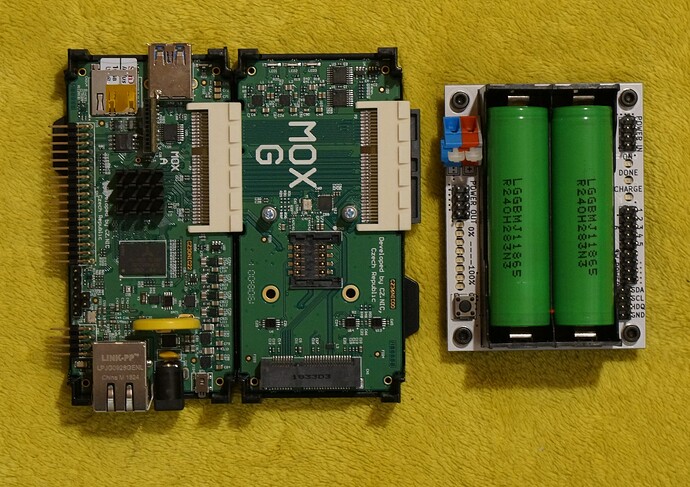Hi,
We use several MOXs for our projects and this device suits us very well with its flexibility. Quite powerful CPU with support for containers. But we have found several times that a module with an independent power supply would be very useful. Something like an “integrated UPS”.
After a long search, we found some similar solutions that would help to be a reference to the design of the new MOX module.
- MLAB LION2CELL, open-source design: LION2CELL01D
- Pi-UpTimeUPSv2
- Lifepo4weredpi-2
- Texas instruments 2 Li-Ion to 12V 4A, development-board
There are relatively similar solutions for raspberry computers (and other SBCs). But they are usually only with 5V output and lack many details that are very useful for use with MOX.
And then we wrote down requirements that would be useful for us and other MOX users. Here there are:
Advantages of that solution:
- Possibility of controlled shutdown
- Emergency power for transient power fails
- Power loss notification, sending and/or saving of important data
- Completion of important operations
- Compactness and design of MOX
- Next independent power input
- Backed-up power output
Specification:
Two cells of Li-Ion batteries in 18650 case
- Capacity around 3600 mAh
- Sufficient to run over 2 hours (It depends on the load and consumption of other connected devices)
- Replaceable (for advanced users)
Complete battery management
- Measuring, charging, protection of cells
- Management over MOXTET bus (probably I2C or SPI)
Independent “high-current” input power source
Similar to the power input on the F MOX module
- Faster charging off MOXTET bus
- Ideally wide input voltage range (8-18V) for direct use in the car or with some MPTT solar tracker.
- Current max 5A
- This voltage should be preferred before “system voltage” on the MOXTET bus
- Second redundant input
Charging
- Adjustable charging current depending on the power input
- Own input (Barrel DC connector; raised charging current)
- MOXTET bus (standard charging current)
- PoE over MOXTET bus (Reduced charging current)
- Monitored charging
MOXTET bus 12V supply
- Complete and independent power supply via MOXTET bus
- Ensuring sufficient power supply in the absence of an external source
- After some search, I found this development board: PMP8921 reference design | TI.com - it corresponds to my idea quite well. (similar design is PMP11479 reference design | TI.com )
- Possibility of disconnecting the “battery power supply” for MOX after switching off the MOX from SW and the possibility of switching on the power supply with the button. After turning on the external power, the MOX output should turn on itself.
12V stabilized output
- To power the previous network element (typically (xDSL, LTE, other…) modems, …)
- To ensure a permanent internet connection and the availability of services on MOX.
- Max current output 1.5A
- Standalone power supply (independent to MOX internal MOXTET power supply)
- Software controlled (allow to detach this output)
- It is also possible to spin the design from the same TI board
Physical realization and connection
There are two possible ways. It is currently unclear to me what is the best.
- Own MOX module (MOXTET bus)
- Probably batteries could fit in that space
- If not - the module would be a wider “2U module” (as MOX E module)
- At the end of MOX MOXTET row (minimum bus requirements)
- Good physical endurance
- MOXTET bus access
- Possibility of connection of two (multiple) modules (Assume change of I2C addresses with header)
- Preserving MOX design
- LED status indicator
- Probably batteries could fit in that space
- Connection through GPIO headers
- Absence of MOXTET bus
Software
- Handling like standard UPS
- Reading of measured values (remaining capacity, current in/out, voltage, battery temperature …)
- Control of battery parameters setup - Capacity, max/min voltage, changing current, …
- Control of outputs - When to disconnect 12V output, when to power-off mox, …
I would like to know if there would be interest in such a thing (from the community and from CZ.NIC), because I think that it is quite a useful MOX module.
